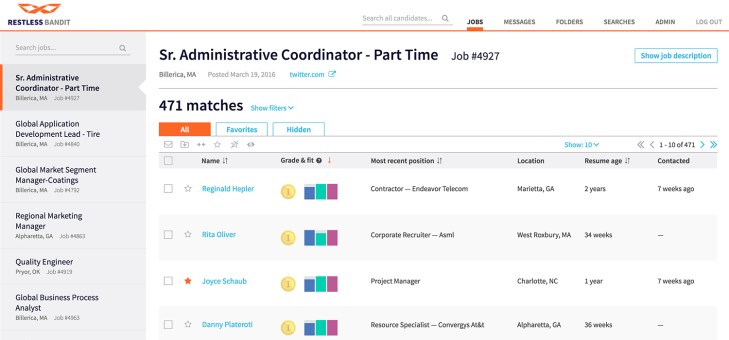While at LinkedIn, Steve Goodman and his co-founders spent a lot of their time trying to help companies dig up the best possible candidates from those that exist around the Web — but might not have applied.
But after candidates have applied, their resumes are sitting in a database somewhere on a company’s servers. And they continue to sit there, likely untouched or only lightly searched, even as companies continue to scour for new potential candidates for roles they need to fill. While those candidates might not have been in the right place at the right time, they might now be the right people to hire.
Restless Bandit, a new company from Goodman and his co-founders, is looking to give companies a way to easily find the best candidates that have already applied, rather than companies having to sift through those existing resumé piles with keywords and the like. Taking a similar approach to how LinkedIn scoured the Internet (and LinkedIn, of course) for new candidates, Restless Bandit finds the highest-potential candidates for roles with statistical modeling. The company said it has raised $8 million in a financing round from GGV Capital and Toba Capital, and it previously raised $2 million in a seed funding round.
“We’re taking a resume, we’re building a statistical model around that resume, abstracting it out and the same for the job descriptions,” Goodman said. “What that gives you is the opportunity that good people don’t fall through the cracks.”
Restless Bandit is essentially trying to draw correlations between a specific candidate and a set of more generalized candidate spaces that might suit specific roles that an employer is looking for. The higher the probability that a candidate fits a certain set of qualifications — as well as the job that recruiters are trying to fill also hitting those same qualifications — the higher they are likely to get surfaced in those results.
Part of the problem is drawing correlations between skill sets in order to find the right position. A recruiter might be looking into old resumes trying to find someone with expertise using Marketo, though if they have expertise using Hubspot those skills might be easily transferable and make those candidates also valuable, Goodman said. Restless Bandit also makes sure that the gaps between an existing resume and the information about that candidate that’s available on the web is also updated, Goodman says, so the company has a continuous profile of that candidate.
Goodman sold his previous company, Bright, to LinkedIn for around $130 million. But while LinkedIn was largely focused on finding new candidates that might not have already applied to those companies, Goodman said he saw an opportunity in doing something that was a little perpendicular in sifting through massive resume piles that already exist. Those piles can even range in the tens, to hundreds of thousands, or even millions for larger enterprises like Coca-Cola.
At the moment, there’s another issue for recruiters as well: candidates that stuff their resumes with keywords in order to get picked up by those search engines. As a result, resumes that are keyword-heavy may end up surfacing higher than candidates that may actually be more qualified, while Restless Bandit looks to try to draw correlations between strong candidates and excise those sorts of problems.
Taking an algorithmic approach, too, can help companies try to excise as much bias as they can throughout the process — because they’re centered around a data-centric approach rather than a simple gut check that might be impacted by an unconscious bias. Though, the algorithms have to be carefully tuned so as to not themselves create weird quirks or biases in the process. That’s always going to be a challenge, and it’s up to the company to ensure that it from running into some kind of endless loop that doesn’t actually achieve what it wants to achieve.
“One thing our algorithm started to notice in working with pharmaceutical companies, [for sales representatives it] started to pick up Smith College, an all women’s college in the northeast, it started to go crazy only surfacing people from Smith College,” Goodman said. “It’s an example where the algorithm can go so far that it becomes discriminatory in the other direction. We had to actually go back and rethink the way we get at those types of algorithms spinning out of control.”
While Goodman says there are no exact direct competitors, there are of course variations — but the larger looming threat is the possibility that Google or Facebook, with their own approaches to doing these kinds of things, could end up open sourcing what they use. That, and keyword search tools for resumes could become increasingly sophisticated, or those tools may also branch into a more algorithmic approach.
In the end, Restless Bandit will have to end up in the hands of job-seekers in some fashion, though Goodman said he isn’t quite sure what that looks like just yet. For now, the company is focusing on large enterprises — ones that generally have more than 1,000 employees — but it’s still going to require the right resumes going to the right spots in the first place, even if they aren’t the right fit at the right time.
“We’re thinking about it from the company perspective, but ultimately where this has to go is the candidate,” Goodman said. “This tech has to get to the candidate to help them weed through where their true opportunities are and where they aren’t and they’re chasing their tail.”
